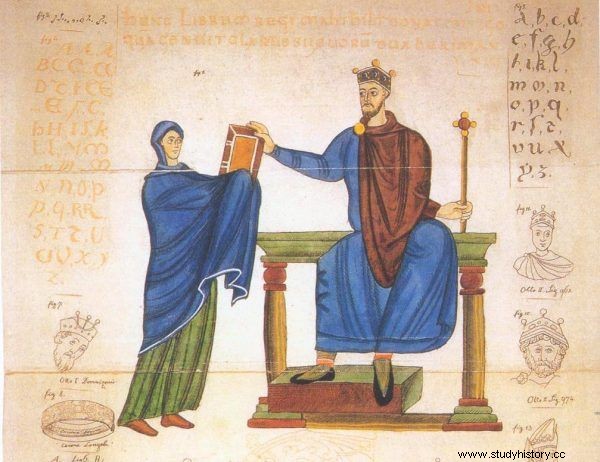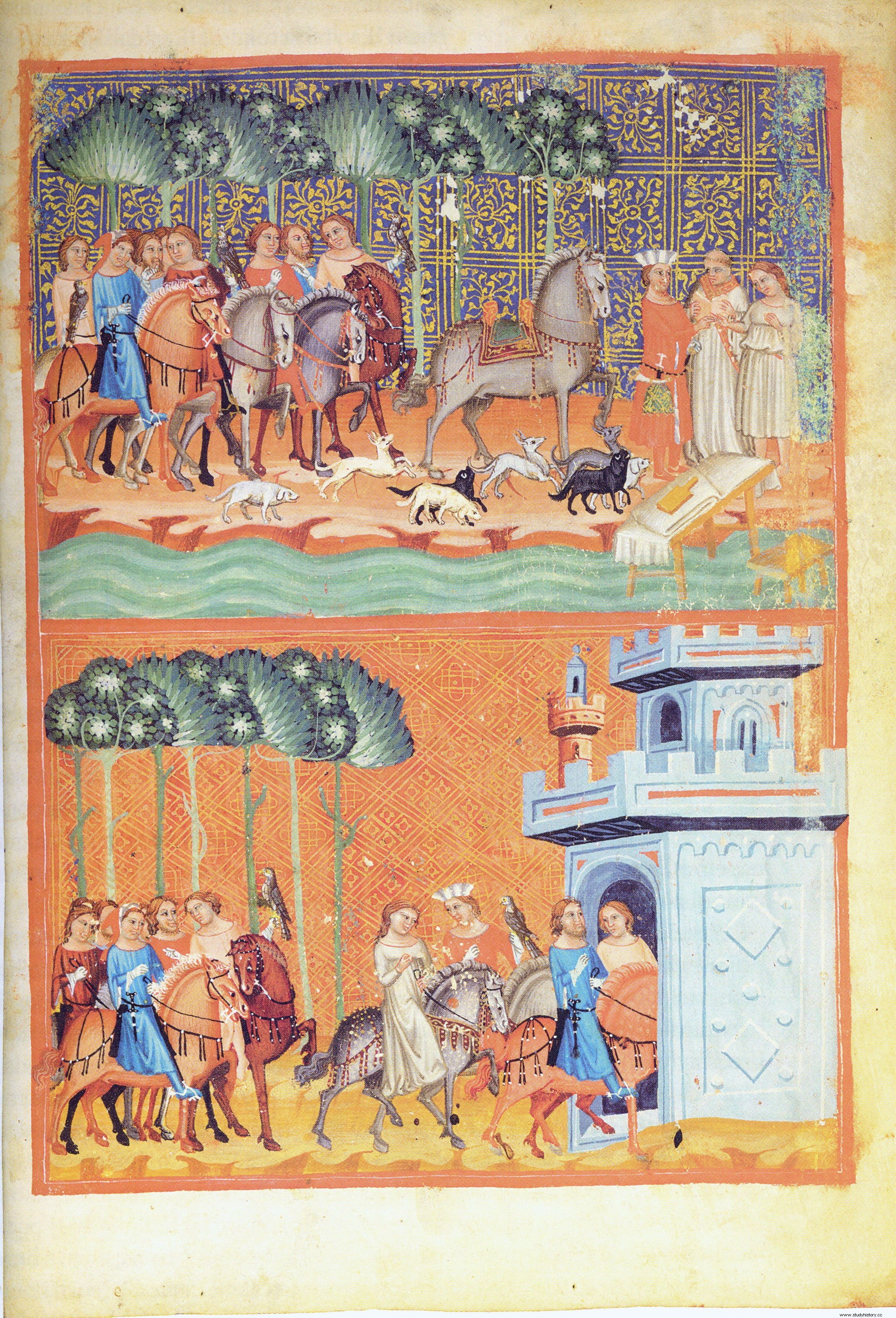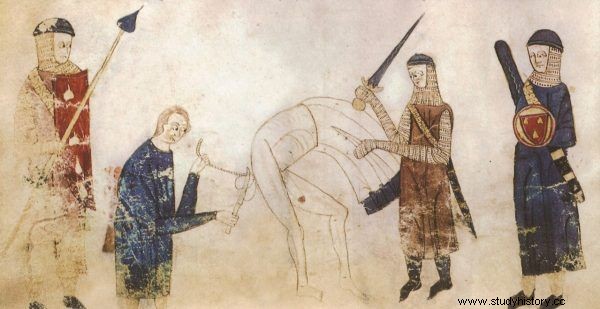There are few sentences in the history of the Polish Middle Ages which raise equally strong opposition. One indiscretion by Gall Anonymus unleashed a storm that continues to this day. And maybe it's not surprising. After all, these are royal testicles.
The Civil War of 1031 ended with a disaster for Mieszko II. Taken in the ticks by the Germans and the Rus', he was forced to flee the country . His older brother sat on the Polish throne - imbued with a desire for revenge and the unpredictable Bezprym . The favorite of Bolesław Chrobry and the second Polish king, meanwhile, stuck in the Czech Republic. He was not welcomed there with open arms.
The prince of Prague, the Ołdrzych, knew his visitor very well. And honestly, he hated him fiercely. At the same time, however, he was not beaten in the dark. For Ołdrzych, the first thing that mattered was business, not mundane emotions and resentment. He has just come into conflict with the German Emperor Conrad II. Now he was looking earnestly for a way to ease his relationship with his stronger neighbor and sovereign. Mieszko fell to him as if from heaven. Or so Oldrzych thought so.

Image of Mieszko II from Codex Matilda (source:public domain).
History has come full circle in its own way. Mieszko was once in Czech captivity. Twenty years ago he was captured by the same - though much younger - Ołdrzych. At that time, Mieszko was not yet a ruler, but only an emissary of Bolesław the Brave. At the same time, however, it was a valuable bargaining chip. Ołdrzych sold it to Germany, with whom Chrobry waged a war that lasted for 16 years. In return, he gained the grace and friendship of the emperor. At the turn of 1031 and 1032, he expected that he would be able to repeat a proven maneuver. He immediately sent emissaries to the Reich. However, these… came back empty-handed.
The Czech ruler underestimated how much the situation had changed. In 1014, Germany was ruled by Henry II, and Poland assumed the role of the player in European politics. Now the founder of the new dynasty, Conrad II, sat on the throne of the Reich. The Piast state, in turn, was pushed to the position of a petitioner. Bezprym ruled in Poznań, considered to be a puppet of the German court. Konrad neither needed the driven-off Mieszko, nor did he care about his future. After all, he helped to deprive him of the throne himself.
Good Knight
The answer was short and firm. According to the chronicler Wipon, "the emperor did not consent to the conclusion of the shameful pact, saying that he did not want to buy the enemy from the enemy." The historian closed the topic on this, without explaining what happened to Mieszko in the Czech dungeon.

The Czech prince of Ołdrzych in a romantic, 19th-century portrait.
Maybe the matter did not interest him, or maybe - he simply did not have any certain information in this regard. Fortunately, we have one more, native source. Polish Chronicle Gallus Anonymus.
This author admitted that Mieszko was a "noble knight", but at the same time he did not spare him punches. First, he summed up his entire reign in two sentences, finding in him no… any apparent success. “He became an object of hatred for all his neighbors as a result of their envy for his father. But he was no longer distinguished, like his father, neither by the advantages of life, nor by customs, nor by riches "- we read in the chronicles.
Gall might have ended there by now. Apparently, however, he did not know what discretion was. Even though Mieszko belonged to the Piast family he praised, as if in passing he said:"They also say that the Czechs captured him treacherously and tied his genitals with straps so that he could no longer produce offspring".

Thanks to the book by Kamil Janicki, you will learn about the history of the women who saved Poland. An uncompromising story of the fall of the Polish empire. Buy today with a discount on empik.com.
That can't be right?
There are few sentences in the history of the Polish Middle Ages which raise equally sharp opposition. Half a century ago, Danuta Borawska stated that Gall Anonymous deliberately manipulated facts. He invented a fairy tale about the castration of the king in order to… justify his recent separation from his wife, Richeza. The wave of criticism has increased in recent years.
An expert on Czech affairs, Marzena Matla-Kozłowska, questioned the date of the event. In her opinion, castration could take place, but only in 1013:during Mieszko's first forced visit to Bohemia. And this despite the fact that the dynasty later had all three children!
In turn, Błażej Śliwiński followed Borawska's footsteps and called into question the very fact that Mieszko had been deprived of his most valuable jewels . In the opinion of this researcher, the credibility of the anecdote was already undermined by Gall Anonymous.
This article has more than one page. Please select another one below to continue reading.Attention! You are not on the first page of the article. If you want to read from the beginning click here.
Crime and Punishment
The monk claimed that "the restraint of the genitals" was a punishment for the actions of Boleslaus the Brave, who caused the Czechs "a similar harm by blinding their prince and his uncle." One must agree that this translation does not make much sense. Chrobry had gouged out the eyes of his namesake, Bolesław III the Red. The man who years ago tried to strangle his younger brother, Ołdrzych. He was his torturer and competitor to power. When he finally lost his eyesight, and thus any hope of a return to politics, the Alder breathed a sigh of relief. He had no reason to take revenge on his kin.
He could, of course, speak on behalf of the entire dynasty, arguing that mutilating any of the Přemyslids would require severe punishment. But in that case, shouldn't he rather blind his neighbor? An eye for an eye, a tooth for a tooth… genitals for genitals. The ancient Babylonians knew the principle of equal payment. And the same was followed in the Middle Ages, when the compensation in silver was not enough to settle the accounts between feuding families.

An altar with an escort on a miniature from the 14th-century Chronicle of Dalimil.
Gall Anonym apparently knew too little about the ancient relations between the Piasts and the Przemyślids to explain how the merciless torture of the Polish king took place. This does not mean, however, that he made up the event itself. Doing so would make no sense. Because why would a chronicler slander the family of his own patron? He would risk offending the princely majesty and withdrawing the promised payment. And all this for one unbelievable rumor? Absurd.
If the monk was not afraid to write about the castration of great-grandfather Bolesław Krzywousty, then apparently people actually "told" about this event. The story had to be widely known, and thus its repetition in no way offended the prince reigning at that time. Gall Anonym simply did his historical duty. And if he is accused of anything, it is only that he tended to combine facts that were completely unrelated to each other. The rumor about Mieszko's fate formed a whole for him with an anecdote about the disgrace of the Czech prince Bolesław. It's a mistake, but each of us makes a similar one.
Good reason for castration
All the above arguments apply equally to the doubts of Błażej Śliwiński and Danuta Borawska. In response to the concept of the latter researcher, however, two more questions can be added.

Castration scene in miniature from 13th century French codex.
Why would Gall Anonymous justify the divorce of Mieszko from Richeza ... if he did not inform at all about the separation of the spouses in his chronicle? This private episode is known only thanks to German sources. And is making a ruler a castrat really the best way to disguise family disagreements? After all, it's like pulling a machine gun to fight a fly ... The alleged conspiracy of the chronicler does not stand up to criticism. In the meantime, it is easy to ascribe a whole range of motivations to the ogre.
Perhaps Gall Anonymous was not aware of this, but the Czech prince did not need to appeal to his brother's injustice in order to seek vengeance against Mieszko. The Polish dynasty humiliated him many times, ravaged his country and kidnapped his subjects. In turn, the father of the unfortunate king years ago boldly took over the entire Czech Republic. Not only did he blind Bolesław III the Red, but he tried to deprive all other representatives of the Přemyslid dynasty from the influence - or even life -. Such an act required a punishment. And castration, which stripped the king of his ability to extend his lineage, was better than any other torture to be a symbol of revenge.

Thanks to the book by Kamil Janicki, you will learn about the history of the women who saved Poland. An uncompromising story of the fall of the Polish empire. Buy today with a discount on empik.com.
Medieval-style vasectomy
The last of the hypotheses remains. Marzena Matla-Kozłowska postponed the event to 1013, adding that there is nothing surprising in the breeding of children by a castrated man. "Let us note that even thanks to the achievements of modern medicine, vasectomy does not guarantee 100% effectiveness" - she said. And of course she was right, but with one reservation.
It is probably worth noting that vasectomy or even chemical castration are quite subtle and humane measures. They do not always bring results, because doctors are also concerned not to injure or poison their patients in an irreversible way. In the eleventh century, little attention was paid to the pain and future quality of life of a testicular patient. And one can suspect that squeezing such a sensitive organ with straps brought 100% results ...
There is no reason to question Gall Anonymous's words. And it is forbidden to do so only because the chronicler gave the Polish king an unflattering testimony. In all probability, Mieszko was really castrated and it happened no other time, but at the turn of 1031 and 1032.
***
Women who gave Poland the crown. An uncompromising story about times of decline and moral decay. Striking silhouettes of great scoundrels. And a story that returns the dignity to the most important ladies in the history of the Polish Middle Ages. You can order Kamil Janicki's book "Damy z skazą" at empik.com today.
Selected bibliography:
The article was based on materials collected by the author during the work on the book "Damy z skazą. The women who crowned Poland " . Some of these items are shown below. Full bibliography in the book.
- M. Ascheri, The Laws of Late Medieval Italy (1000–1500). Foundations for a European Legal System , Leiden 2013.
- J. Banaszkiewicz, Gall as a serious historian, or why the stories of Bolesław the Brave and Bolesław the Wrymouth are true and non-grotesque , "Przegląd Historyczny", vol. 99 (2008).
- D. Borawska, The crisis of the early Piast monarchy in the 1330s , Warsaw 2013.
- G. Labuda, Mieszko II, King of Poland (1025–1034). Breakthrough times in the history of the Polish state , Poznań 2008.
- M. Matla-Kozłowska, The First Przemyślids and their country (from the 10th to the mid-11th century) , Poznań 2008.
- A. Pleszczyński, Germany towards the first Piast monarchy (963–1034). The birth of the stereotype , Lublin 2008.
- D.L. Smail, K. Gibson, Vengeance in Medieval Europe , Toronto 2009.
- B. Śliwiński, Bezprym. Firstborn son of the first king of Poland (986 – winter / spring 1032) , Krakow 2014.
- S. Zakrzewski, Bolesław the Brave , Lviv 1925.
